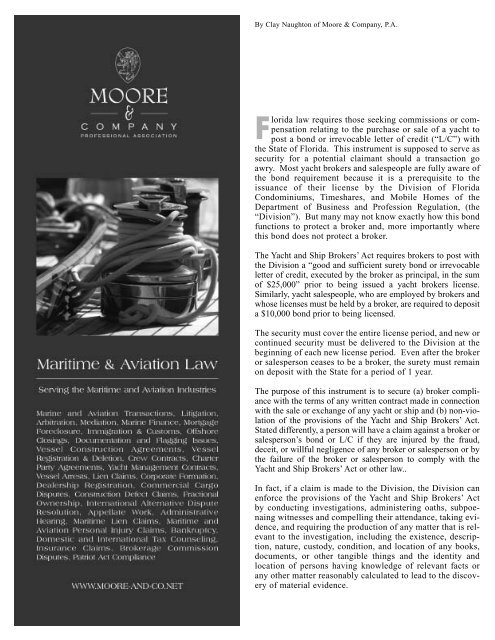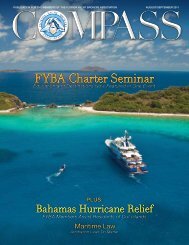October 2009 - Florida Yacht Brokers Association, Inc.
October 2009 - Florida Yacht Brokers Association, Inc.
October 2009 - Florida Yacht Brokers Association, Inc.
Create successful ePaper yourself
Turn your PDF publications into a flip-book with our unique Google optimized e-Paper software.
By Clay Naughton of Moore & Company, P.A.<br />
F lorida<br />
law requires those seeking commissions or compensation<br />
relating to the purchase or sale of a yacht to<br />
post a bond or irrevocable letter of credit (“L/C”) with<br />
the State of <strong>Florida</strong>. This instrument is supposed to serve as<br />
security for a potential claimant should a transaction go<br />
awry. Most yacht brokers and salespeople are fully aware of<br />
the bond requirement because it is a prerequisite to the<br />
issuance of their license by the Division of <strong>Florida</strong><br />
Condominiums, Timeshares, and Mobile Homes of the<br />
Department of Business and Profession Regulation, (the<br />
“Division”). But many may not know exactly how this bond<br />
functions to protect a broker and, more importantly where<br />
this bond does not protect a broker.<br />
The <strong>Yacht</strong> and Ship <strong>Brokers</strong>’ Act requires brokers to post with<br />
the Division a “good and sufficient surety bond or irrevocable<br />
letter of credit, executed by the broker as principal, in the sum<br />
of $25,000” prior to being issued a yacht brokers license.<br />
Similarly, yacht salespeople, who are employed by brokers and<br />
whose licenses must be held by a broker, are required to deposit<br />
a $10,000 bond prior to being licensed.<br />
The security must cover the entire license period, and new or<br />
continued security must be delivered to the Division at the<br />
beginning of each new license period. Even after the broker<br />
or salesperson ceases to be a broker, the surety must remain<br />
on deposit with the State for a period of 1 year.<br />
The purpose of this instrument is to secure (a) broker compliance<br />
with the terms of any written contract made in connection<br />
with the sale or exchange of any yacht or ship and (b) non-violation<br />
of the provisions of the <strong>Yacht</strong> and Ship <strong>Brokers</strong>’ Act.<br />
Stated differently, a person will have a claim against a broker or<br />
salesperson’s bond or L/C if they are injured by the fraud,<br />
deceit, or willful negligence of any broker or salesperson or by<br />
the failure of the broker or salesperson to comply with the<br />
<strong>Yacht</strong> and Ship <strong>Brokers</strong>’ Act or other law..<br />
In fact, if a claim is made to the Division, the Division can<br />
enforce the provisions of the <strong>Yacht</strong> and Ship <strong>Brokers</strong>’ Act<br />
by conducting investigations, administering oaths, subpoenaing<br />
witnesses and compelling their attendance, taking evidence,<br />
and requiring the production of any matter that is relevant<br />
to the investigation, including the existence, description,<br />
nature, custody, condition, and location of any books,<br />
documents, or other tangible things and the identity and<br />
location of persons having knowledge of relevant facts or<br />
any other matter reasonably calculated to lead to the discovery<br />
of material evidence.











